
"Media" used to mean "print media" like books and newspapers, but the world has grown. Today media can also mean radio, television and movies delivered to personal computers, tablets and cell phones. As the world's best selling book of all time the Bible continues to make headlines, both good and bad, across all forms of media. Democrat senator Lionell Spurnill says Christians should "trust in God" for protection, the History Channel produces a new series about Jesus, and an Israeli doctor compares Mario Cuomo and New York's new abortion law to the Pharaoh of the Exodus.
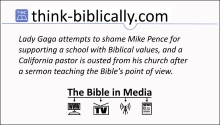
"Media" used to mean "print media" like books and newspapers, but the world has grown. Today media can also mean radio, television and movies delivered to personal computers, tablets and cell phones. As the world's best selling book of all time the Bible continues to make headlines, both good and bad, across all forms of media. Lady Gaga attempts to shame Mike Pence and his wife for supporting a school with Biblical values while claiming to be a Christian herself, and a California pastor is ousted from his church after a sermon teaching the Bible's point of view on LGBTQ issues.
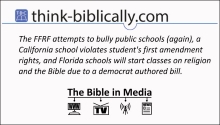
"Media" used to mean "print media" like books and newspapers, but the world has grown. Today media can also mean radio, television and movies delivered to personal computers, tablets and cell phones. As the world's best selling book of all time the Bible continues to make headlines, both good and bad, across all forms of media. The FFRF attempts to bully public schools (again) while Ken Ham offers those same schools liberty and protection, a California school violates student's first amendment rights, and Florida schools will start classes on religion and the Bible due to a democrat bill.
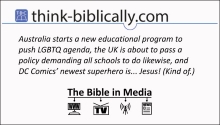
"Media" used to mean "print media" like books and newspapers, but the world has grown. Today media can also mean radio, television and movies delivered to personal computers, tablets and cell phones. As the world's best selling book of all time the Bible continues to make headlines, both good and bad, across all forms of media. Australia starts a new educational program in public schools to push LGBTQ agenda, the UK is planning to pass a policy demanding all schools "actively promote" the LGBTQ agenda, and DC Comics newest superhero getting a six issue deal is... Jesus! (Kind of.)

In Genesis chapter twelve we see the promise that the nation of Israel will be founded by God through Abraham, “I will make you into a great nation and I will bless you; I will make your name great, and you will be a blessing." In this disclosure of future events, God also makes a promise saying, "I will bless those who bless you, and whoever curses you I will curse....” Centuries later, (about 750 BC), Jonah visits Nineveh and prevailed upon them a mass revival. Because of their remarkable about-face and repentance to Elohim, God spared them.
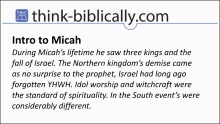
When Jeremiah prophesied Assyria’s routing of Israel and Judah, he was promptly arrested and tried for treason (Jeremiah 26.7-.19). While the court debated his fate (most favoring Jeremiah’s execution) one councilman remembered a passage of God’s Word that applied to this situation. He recited Micah for the council, showing that when the prophet of old spoke those same words a century ago, he was not arrested for treason. Instead, the people repented and the Lord relented his wrath. The court agreed to follow the precedent of Micah and spared Jeremiah’s life. In this case, God’s Word literally leads to life.

To understand Jonah requires understanding some of the history of his time. The Assyrian empire formed circa 1100 b.c. and began a military empowered expansion program a couple centuries later. During Jonah’s lifetime, the Assyrians had enveloped many Syrian and Palestinian territories and had become the greatest world power. Even the Northern Kingdom paid duties to Assyria, causing a hatred of Assyrians by Jews that surpasses any good sports rivalry today. Running a close second in military power and Semitic hatred were the Babylonians, who would some centuries later conquer Assyria and lead the Southern Kingdom into captivity.
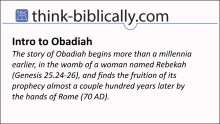
The story of Obadiah begins more than a millennia earlier, in the womb of a woman named Rebekah (Genesis 25.24-26), and finds the fruition of its prophecy almost a couple hundred years later by the hands of Rome (70 AD). What appears on the surface of this, the shortest book in the Old Testament (all of 21 verses), is merely the tip of the proverbial iceberg. One has to dig a little deeper to uncover the rich history and incredible fulfillment of prophecy which this narrative rests atop. It is a story twelve hundred years in the making.

After helping a friend move last Saturday I sat down at 3Margaritas for dinner. I love Mexican and Tex-Mex food, and proudly ordered the Macho Burrito, asking my server only one question: "Does that come with a side of toxic masculinity?" For those who haven't heard, the term "toxic masculinity" started in America's most liberal college campuses and has become a topic for pundits on all the cable news shows. It is defined as a sharp focus on the pattern of bad behavior men exhibit, but it also is used as an excuse for feminists and others to criticize masculinity in general.

Last Thursday's article Think-Biblically vs. Nancy Pelosi generated more email than any other article to date. The theme of the bulk of those emails was regarding undocumented immigrants and concern for their welfare. Specifically, the question regarding a Christian's responsibility to people in need — but this question was split into two distinct divisions (likely based on the writers perception of illegal immigration). One part of the question was about our responsibility to the needy in general and the other half was regarding a Christian's responsibility to the needy who are lawbreakers. The other big question was what is a Christian nations responsibility to the world's poor?

On January 3, hours after becoming House Speaker, congresswoman Nancy Pelosi expressed her view about building a border wall, "The wall is, in my view, immoral..." I'd like to know what her moral standard is because, although she is Catholic, it is not the Bible. Ever since King David built a wall around Jerusalem (a wall that Nehemiah rebuilt at God's leading), walls have been important to the nation of Israel. Even today, Israel walls off parts of their border with Egypt and around some Palestinian communities to keep terrorists at bay. Israel has known from its beginning that walls work.

King David was no stranger to surprising circumstances. On multiple occasions he found himself either on the run, or warring against surrounding nations. Feeling like the sword of Damocles was waiting to drop on him, it appeared from his perspective that God was no where to be found. Most of us have been there. Probably not running from those who want to murder us our dealing with a national crises, but we've had relationships that fail, declining health, or situations at work that threaten our career. We find ourselves in situations beyond our control and feel helpless as a result.

